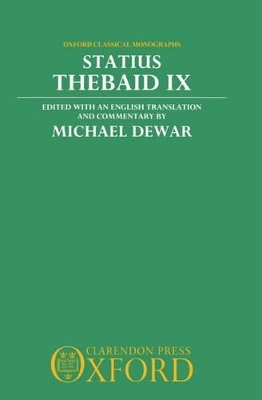Oxford Classical Monographs
1 total work
BLWith Latin text and English translation
The epic poem the Thebaid was composed by Statius about AD 80 to 92 in twelve books. The subject is the expedition of the Seven against Thebes in support of the attempt by Oedipus' son Polyneices to recover the throne from his brother Eteocles. Book IX is set in the midst of the fighting before the eventual death of the two brothers.
In this new edition of Book IX Dr Dewar accompanies the Latin text with apparatus criticus, a translation, and an extensive introduction and commentary. The introduction contains sections on Statius' life and works, a summary of the epic, its themes and characters, and poetry, the textual tradition, and Statius' influence on later European literature. The commentary, the first on the ninth book to be published in Britain this century, is written in the light of recent scholarship. It examines
in close detail Statius' style and language, use of models (especially Homer, Hellenistic Greek poetry, Virgil, Lucan, and Seneca), and literary intentions. It is Dr Dewar's hope that this edition will help to explain the poem's great popularity in the Middle Ages, and even restore something of its
lost prestige.
The epic poem the Thebaid was composed by Statius about AD 80 to 92 in twelve books. The subject is the expedition of the Seven against Thebes in support of the attempt by Oedipus' son Polyneices to recover the throne from his brother Eteocles. Book IX is set in the midst of the fighting before the eventual death of the two brothers.
In this new edition of Book IX Dr Dewar accompanies the Latin text with apparatus criticus, a translation, and an extensive introduction and commentary. The introduction contains sections on Statius' life and works, a summary of the epic, its themes and characters, and poetry, the textual tradition, and Statius' influence on later European literature. The commentary, the first on the ninth book to be published in Britain this century, is written in the light of recent scholarship. It examines
in close detail Statius' style and language, use of models (especially Homer, Hellenistic Greek poetry, Virgil, Lucan, and Seneca), and literary intentions. It is Dr Dewar's hope that this edition will help to explain the poem's great popularity in the Middle Ages, and even restore something of its
lost prestige.
